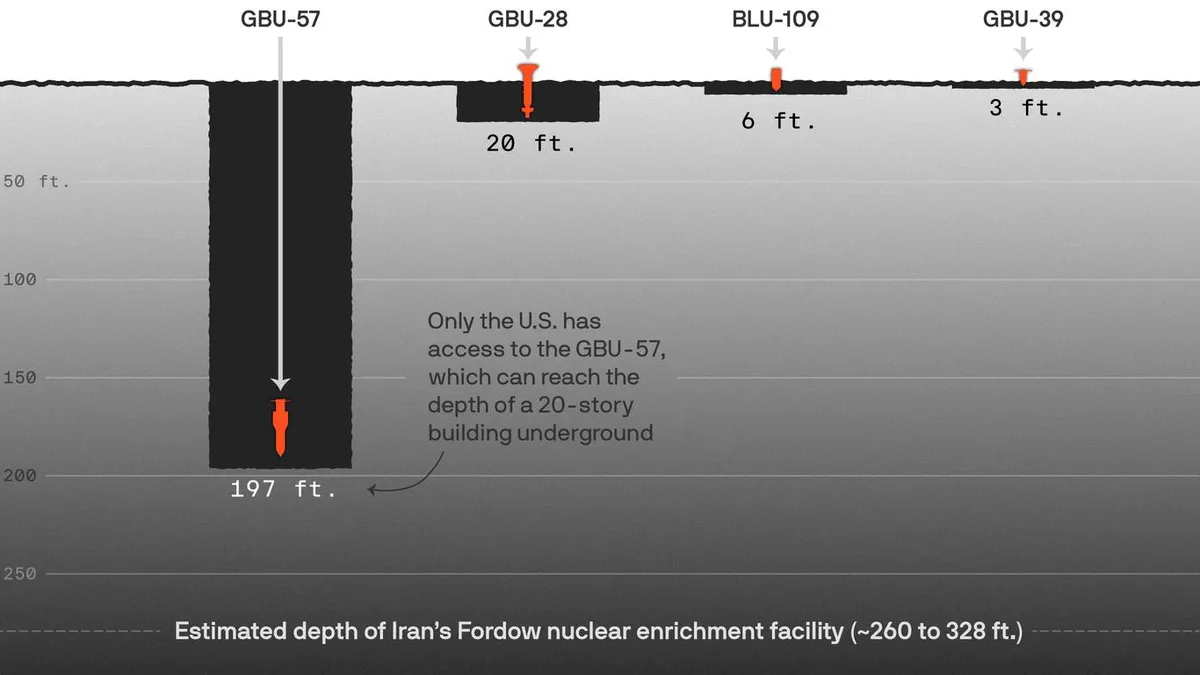
A 30,000-pound bomb is emerging as a pivotal weapon in Israel's ongoing conflict with Iran, and it is currently held within the arsenal of the U.S. military. This bomb, known as the GBU-57 E/B Massive Ordnance Penetrator (MOP), represents the most powerful non-nuclear weapon in the world, specifically crafted to target critical Iranian facilities that Israel's own weaponry cannot effectively reach.
The GBU-57 E/B, or MOP, is a precision-guided bomb designed to execute complex missions, primarily aimed at neutralizing adversaries' weapons of mass destruction located in heavily fortified sites. The U.S. Air Force highlighted its capability in 2015, emphasizing its effectiveness as a bunker-buster. This characteristic is crucial for Israel, especially considering Iran's Fordow facility, which is strategically built into a mountain and lies hundreds of feet underground, making it a formidable target for traditional weaponry.
If Iran's Fordow facility remains operational and undamaged, the nation’s nuclear program — which Israel is committed to dismantling — could gain momentum. As Israeli Ambassador to the U.S. Yechiel Leiter stated, the operation must culminate with the destruction of Fordow. This is where U.S. assistance, particularly through the use of the MOP, becomes vital, as the bombs currently available to Israel do not possess the same level of penetrating power.
The U.S. would likely deploy B-2 Spirit stealth bombers to deliver the MOP. This aircraft is renowned for its ability to fly long distances quietly, making it an ideal platform for such high-stakes missions. According to Colin Demarest, a defense reporter at Axios, the combination of a B-2 bomber dropping a MOP represents one of the most powerful military actions available — second only to nuclear options.
Utilizing the MOP presents unprecedented challenges. Experts suggest that to effectively destroy the Fordow facility, at least two MOPs would be required, each needing to hit the same target precisely. Robert Pape, a U.S. military historian and author of "Bombing to Win," noted that while the U.S. Air Force possesses the technical capability, this type of operation has never been executed in an actual combat scenario.
In recent developments, President Trump indicated that Iran is still interested in negotiating with the U.S., proposing a delegation visit to the White House. However, he also warned that time is running out for diplomatic talks and suggested he might soon authorize military strikes. Such actions could provoke Iranian retaliation against U.S. bases and interests in the region, potentially leading to a prolonged conflict.
During a Senate hearing, Defense Secretary Pete Hegseth refrained from disclosing specific U.S. military strategies regarding Iran, asserting that the Pentagon would be prepared to carry out any orders issued by President Trump. The situation remains fluid, highlighting the critical role of advanced weaponry like the MOP in shaping the future of U.S.-Iran relations and Israel's defense strategy.